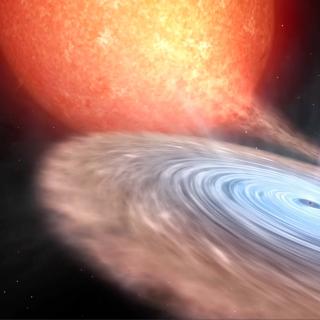Bibcode
Miceli, C.; Mata Sánchez, D.; Anitra, A.; Muñoz-Darias, T.; Di Salvo, T.; Iaria, R.; Marino, A.; Leone, W.; Del Santo, M.; Armas-Padilla, M.; Degenaar, N.; Miller, J. M.; Reynolds, M.
Referencia bibliográfica
Astronomy and Astrophysics
Fecha de publicación:
4
2024
Revista
Número de citas
2
Número de citas referidas
2
Descripción
The X-ray dipper MAXI J1305-704 is a dynamically confirmed black hole (BH) X-ray binary discovered a decade ago. While its only outburst has been studied in detail in X-rays, follow-up at other wavelengths has been scarce. We report here the results from an optical spectroscopy campaign across the outburst of MAXI J1305-704. We analysed two epochs of data obtained by the Magellan Clay Telescope during two consecutive nights, when the source was in a soft X-ray spectral state. We identified typical emission lines from outbursting low-mass X-ray binaries, such as the hydrogen Balmer series, He II 4686 Å and the Bowen blend. We focused our analysis on the prominent Hα line, which exhibits asymmetric emission and variable absorption components. We applied both traditional analytical methods and machine-learning techniques in order to explore the association of the absorption features with outflowing phenomena, and we conclude that they are best explained by broad absorption. This result is consistent with reports from other outbursting BHs, where optical outflows have predominantly been observed in the hard state. Further observations at different X-ray states are key to properly test whether this behaviour is universal and to determine the implications for the disc wind physics.
Proyectos relacionados

Agujeros negros, estrellas de neutrones, enanas blancas y su entorno local
Los agujeros negros y estrellas de neutrones en binarias de rayos-X son laboratorios únicos para explorar la física de estos objetos compactos. No solo permiten confirmar la existencia de agujeros negros de origen estelar a través de mediciones dinámicas de sus masas, sino que también permiten investigar el comportamiento de la materia y la
Montserrat
Armas Padilla